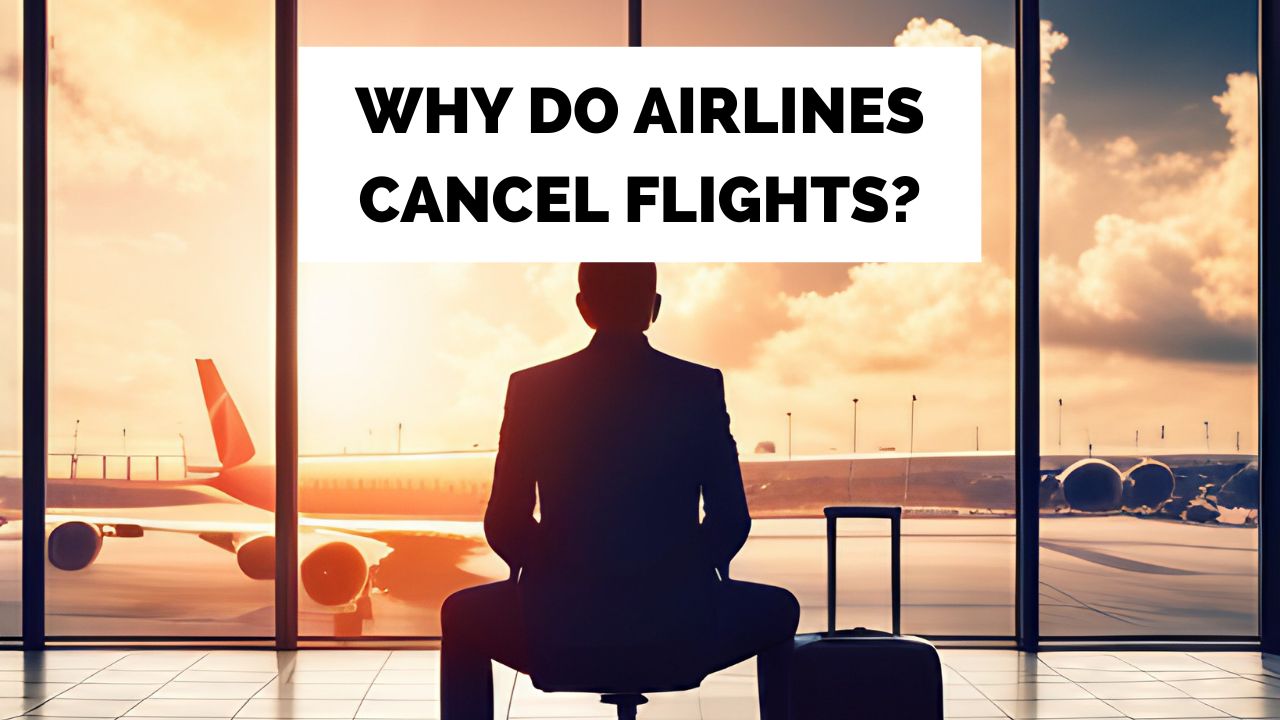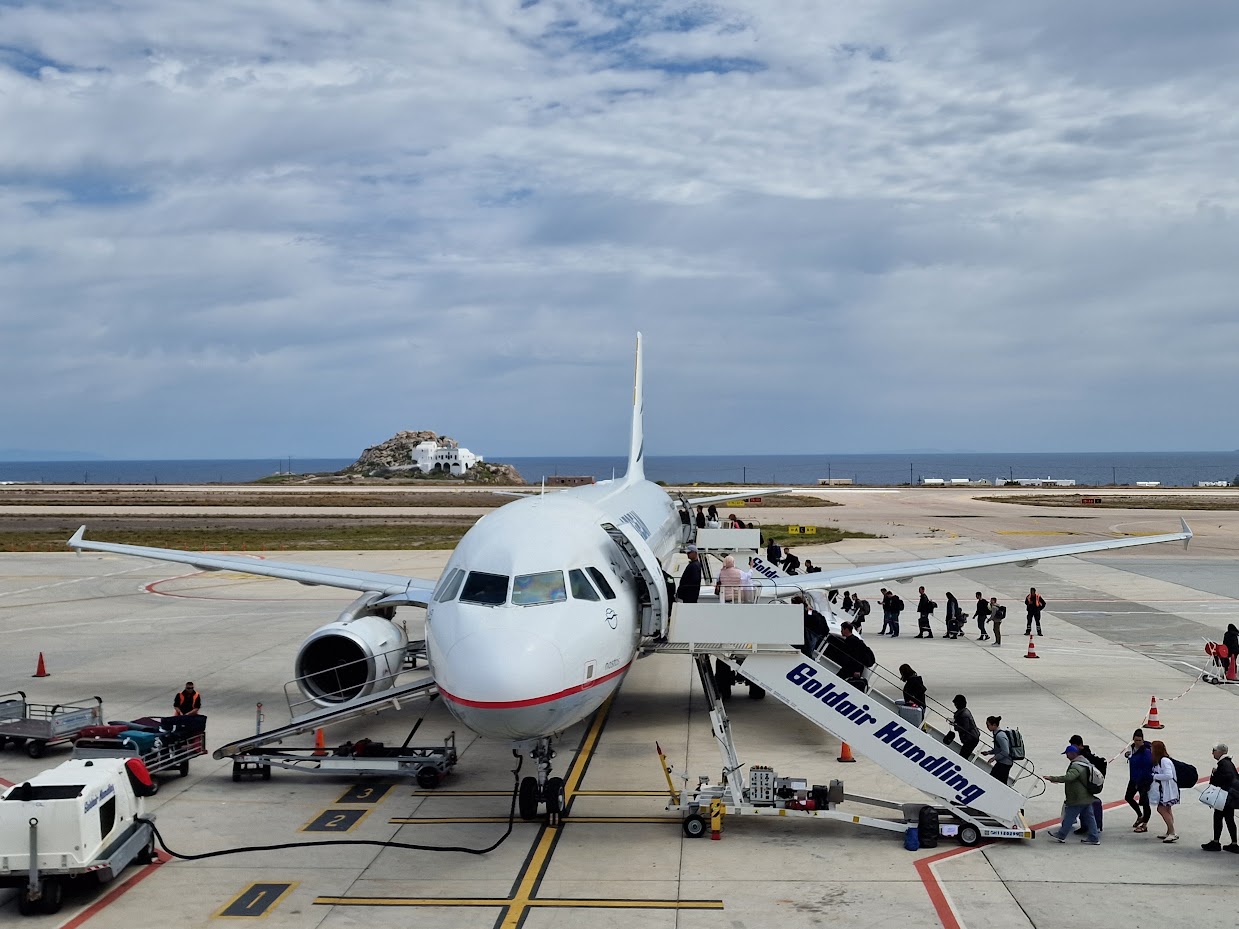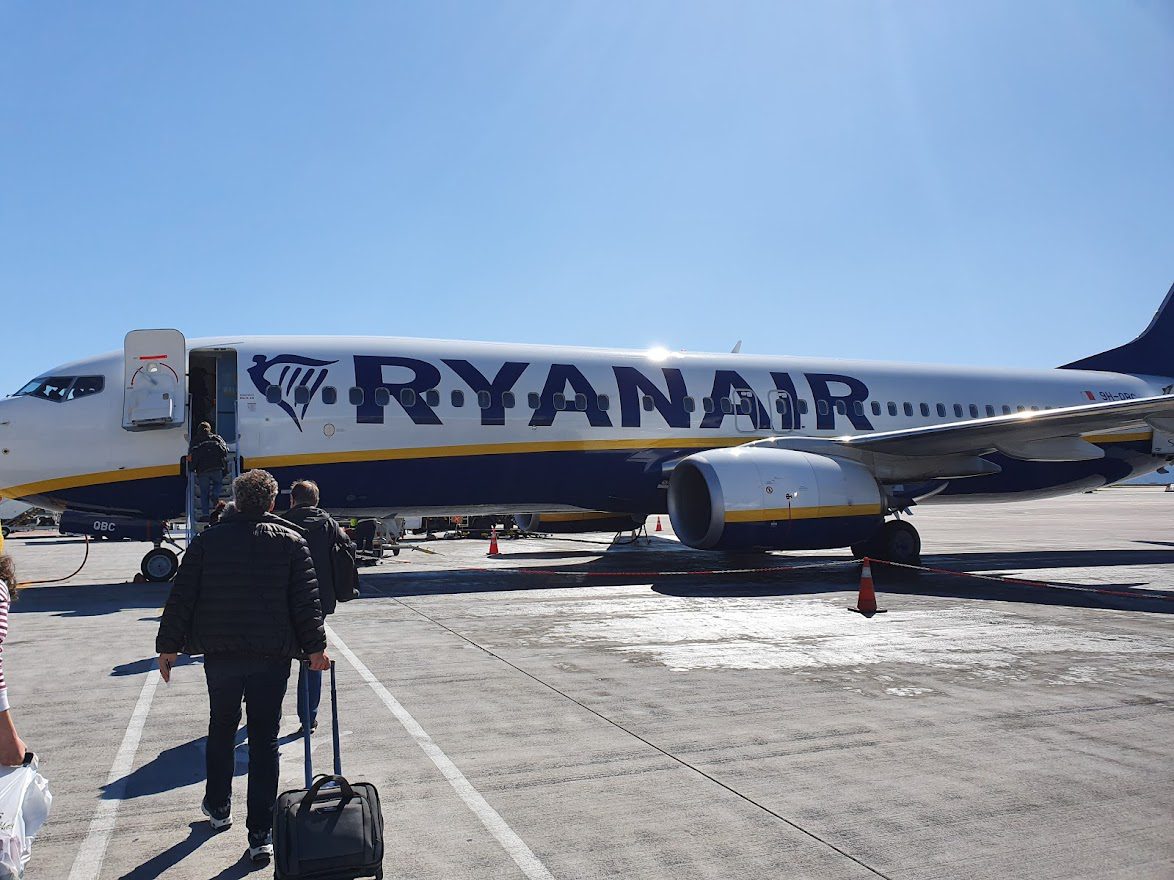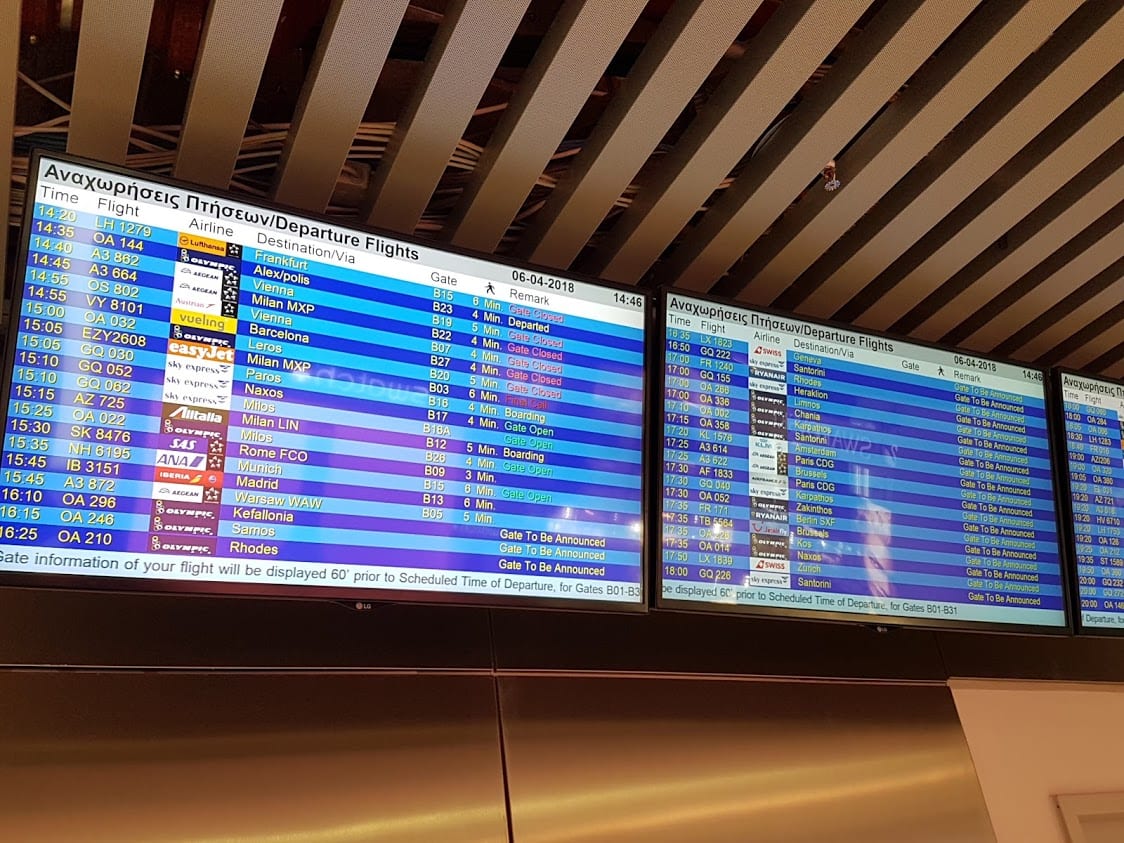Flights can get cancelled by airlines due to various reasons such as extreme weather conditions, mechanical issues, crew unavailability, and air traffic control restrictions.

Why do airlines cancel flights?
Ever had your travel plans upended by a flight cancellation? If so, you're not alone. In the world of air travel, flight cancellations are an unfortunate reality.
Over here in the EU, there's some limited rules in place to protect passengers when flights are cancelled. In the US, there's also supposed to be some. But leave a comment as to how good you think they are!
In addition, how inconvenient a cancellation can be might depend on when the flight got cancelled.
For example, I had a flight cancelled several weeks before I was due to fly from the UK back to Athens in Greece where I live. While not the end of the world, I wasn't entitled to a refund (according to them), and was put on the next available flight – One of those unsocial flights at 6 in the morning that no one really likes. Thanks KLM – I don't think I'll use you again!
I've also had a flight cancelled by Ryanair a few weeks before it was due to fly, and given a voucher for the same price. Not much use when there's no flights available at the price I originally paid! I think I'll stick with Aegean in future, they're much more reliable.

And both of these times, they couldn't blame the weather or other circumstances. These flight cancellations were purely down to the airlines reorganizing their flights at customer expense.
At the end of the day, do you know what? The airlines get away with the minimum responsibility and it's us as passengers that get messed around.
Related: Air Travel Tips
Reasons why flights are cancelled
Anyway, that's my little rant over – almost! To get it out of my system, I wrote this guide on “why flights get cancelled”.
What I want you to remember though, is that while it's not always the airline's fault, how they treat you as a customer when they do cancel a flight is all down to them.
So, get ready to dive into the fascinating reasons behind flight cancellations, from weather-related causes to unexpected events and extraordinary circumstances. Buckle up and let's explore the factors that can ground your travel plans.
- Weather-related causes, technical issues, and misjudging passenger demand are common reasons for flight cancellations.
- Unexpected events like bird strikes and labor disputes can lead to disruptions in air travel.
- Natural disasters and pandemics may cause significant disruption to flights due to airspace restrictions or infrastructure issues.
Weather-Related Causes
Mother Nature can be a fickle friend when it comes to air travel. Weather affects safety, and thus is an important factor to consider when scheduling flights. Consequently, weather-related causes are among the most common reasons for flight cancellations. Snow, ice, thunderstorms, and extreme temperatures can all wreak havoc on flight schedules, forcing airlines to cancel flights for the safety of passengers and crew alike.
So what exactly happens when the skies turn dark and stormy? Here's how meteorological menaces can put a damper on your travel plans.
Snow and Ice
Winter weather can be a major headache for air travel. Snow and ice can cause poor visibility and make runways slippery, making it challenging for pilots to navigate and for planes to take off and land safely. De-icing planes can also be a time-consuming process, leading to delays and potential cancellations.
So when Jack Frost comes nipping at the airport's nose, it's no wonder that flights can get grounded.
Thunderstorms and High Winds
Thunderstorms and high winds are another meteorological threat to flights. Turbulence caused by these weather conditions can make flying uncomfortable and even dangerous, prompting airlines to delay or cancel flights for safety reasons.
High winds can also reduce visibility and push aircraft off course, adding more potential for delays and cancellations. When the wind howls and lightning strikes, it's best to double-check your flight status and be prepared for possible changes to your travel plans.
Extreme Temperatures
Extreme temperatures, both hot and cold, can throw a wrench into air travel. Hot air is less dense, making it harder for planes to take off and land, while jet fuel can freeze or gel in extreme cold, leading to delays or cancellations.
Aircraft cruising at high altitudes can experience temperatures as low as minus 50 to minus 70°F for hours, potentially causing mechanical issues and damage to internal components. When the mercury soars or plummets, it's wise to keep an eye on your flight status and be ready for potential disruptions.
Related: Advantages and disadvantages to air travel

Related: Airport Captions
Technical Issues and Maintenance
While weather can be unpredictable, sometimes it's the aircraft itself that's the culprit behind flight cancellations. Technical issues and maintenance hiccups can ground a plane, leaving passengers scrambling to find alternative travel arrangements.
Mechanical failures, IT system outages, and maintenance delays can all contribute to these unforeseen cancellations. To be fair though, do you really want to fly on a plane that you know for a fact has problems? Cancelling it's flight is the only sensible thing to do!
Mechanical Failures
Mechanical failures encompass any problems with the aircraft that render it unsafe or unable to fly. These issues can stem from wear and tear, inadequate maintenance, or faulty parts. When mechanical breakdowns occur, airlines may need to cancel flights due to safety concerns or an inability to quickly repair the problem.
Ensuring regular maintenance and inspections, as well as using quality parts and materials, is crucial to avoiding these technical takedowns.
IT System Outages
In our increasingly digital world, IT system outages can spell disaster for air travel. When systems go down, flight delays and cancellations can quickly snowball, as seen in cases like the FAA computer outage that led to thousands of delayed and cancelled flights.
IT system crashes can be caused by power outages, hardware or software malfunctions, or even cyberattacks. As our reliance on technology grows, so too does the potential for IT-induced flight cancellations.
Maintenance Delays
Last-minute maintenance delays can also put a damper on your travel plans. A lack of available planes due to maintenance issues can result in flight cancellations. When airlines fail to keep up with maintenance needs or face staffing shortages, flights may need to be rescheduled, causing inconvenience and financial losses for both passengers and airlines.
To minimize the impact of maintenance delays, airlines must plan their maintenance schedules carefully and ensure adequate staffing levels.
Related: How to find cheap flights

Related: Greek islands with airports
How flights get cancelled: Crew Availability and Scheduling
Even when the skies are clear and the plane is in tip-top shape, crew availability and scheduling can still throw a wrench into your travel plans. Missing or unfit crew members, crew scheduling errors, and crew fatigue and regulations can all lead to flight cancellations.
It's taken a while for airlines to replace air crew that were either fired, laid off, or retired during the pandemic, meaning that while flights are scheduled, there might not be enough crew to operate them.
Missing or Unfit Crew Members
A flight is only as good as its crew, and when key members are missing or deemed unfit to fly, cancellations can ensue. Pilots or flight attendants may be absent due to illness, unexpected personal emergencies, or even showing up to work under the influence. In these cases, airlines may need to cancel the flight if they cannot find suitable replacements in time.
The consequences of such cancellations can be far-reaching. Passengers may be stranded, unable to reach their destination, and the airline may be liable for any additional costs incurred. Furthermore, the airline may have to pay out.
Crew Scheduling Errors
Mistakes happen, and sometimes they can result in crew scheduling errors. When airlines fail to properly plan their crew schedules, it can lead to a shortage of available crew members and, ultimately, flight cancellations.
To reduce the impact of crew scheduling errors, airlines must be diligent in their planning and ensure they have enough crew members to cover all flights. Some airlines are notorious for making the same errors of scheduling over and over again.
Crew Fatigue and Regulations
Crew fatigue and regulations can also play a role in flight cancellations. Pilots and flight attendants are subject to strict Flight Time Limitations (FTLs) to reduce the risk of fatigue-related accidents. When crew members reach their FTLs or are deemed too fatigued to fly, flights may be cancelled to ensure passenger safety.
Sticking to these regulations is crucial for maintaining the safety and well-being of both crew members and passengers alike.
Related: International Travel Checklist
Security Concerns and Threats
In today's world, security concerns and threats can't be ignored when it comes to air travel. Flight cancellations can arise from bomb scares and terrorist threats, civil unrest and airport incidents, and enhanced security measures. While these situations may be rare, they can have a significant impact on the airline industry and the safety of passengers.
Security-related flight cancellations can happen in the following circumstances:
Bomb Scares and Terrorist Threats
When it comes to security concerns, bomb scares and terrorist threats are some of the most serious issues airlines face. These threats can lead to flight cancellations as airlines and airports are forced to evacuate, search, and implement additional security measures.
To prevent and mitigate the impact of bomb scares and terrorist threats, airports and airlines employ rigorous security checks, bomb-sniffing dogs, and increased security staff presence.
Civil Unrest and Airport Incidents
Civil unrest and airport incidents, such as protests, riots, strikes, or security threats, can also result in flight cancellations. Safety concerns and operational impacts from these events may force airlines to delay or cancel flights to protect passengers and crew members.
In such cases, airlines may waive change and cancellation fees to encourage passengers to alter their travel plans.
Enhanced Security Measures
While enhanced security measures are designed to keep passengers and crew safe, they can sometimes lead to flight cancellations. Increased screenings, additional security personnel, and stricter rules may cause delays and longer security checks.
However, there's no clear evidence that enhanced security measures directly result in flight cancellations.
Related: Can you bring spices on a plane
Misjudging Passenger Demand – Overbooking and Underbooking
Airlines are in the business of maximizing profits, and sometimes their strategies for filling seats can lead to flight cancellations. Misjudging passenger demand can result in overbooked flights, low passenger numbers, and cancellations due to seasonal demand or economic factors.
Overbooked Flights
Overbooking is a common practice among airlines, where they sell more tickets than there are seats on a flight, anticipating that some passengers won't show up. When too many passengers show up, airlines may ask for volunteers to switch to a different flight, offering incentives like cash or vouchers.
If not enough volunteers come forward, some passengers may be involuntarily bumped off the flight, leading to cancellations and delays.
Low Passenger Numbers
On the flip side, low passenger numbers can also lead to flight cancellations. If an airline can't cover the costs of operating a flight due to a lack of passengers, they may decide to cancel the flight.
Factors contributing to low passenger numbers can include seasonal demand, economic factors, and overbooking practices.
Seasonal Demand and Economic Factors
Seasonal demand, such as holiday travel peaks or off-peak travel times, and economic factors can also play a role in flight cancellations. Airlines may adjust their schedules based on demand and economic conditions, which can contribute to cancellations.
Additionally, economic factors can lead to labor shortages, causing mass flight cancellations due to a lack of available staff.
Related: Can you take a powerbank on a plane
Air Traffic Control and Airport Restrictions
Navigating the skies isn't always smooth sailing, and air traffic control and airport restrictions can lead to flight cancellations. Limited time slots, airport infrastructure issues, and airspace restrictions all play a part in these disruptions. Some countries are also well known for their periodic air traffic control strikes. I'm looking at you France!
Limited Time Slots
Airports allocate limited time slots for takeoffs and landings, as determined by the Federal Aviation Administration (FAA). When a flight is delayed, it may miss its allocated time slot, forcing the airline to reschedule the flight.
If rescheduling isn't possible within the given timeframe, the flight may be cancelled due to the use-it-or-lose-it rule.
Airport Infrastructure Issues
Airport infrastructure issues, such as problems with runways or air traffic control systems, can also lead to flight cancellations. Safety concerns and operational impacts may force airlines to cancel flights if the issue cannot be resolved in a timely manner.
Delays caused by airport infrastructure issues can also lead to cancellations if the airline is unable to accommodate all passengers on alternative flights.
Airspace Restrictions
Airspace restrictions are rules that limit the number of flights that can operate in a certain area, imposed by governments or other authorities for safety or security reasons. These restrictions can result in flight cancellations, as airlines are forced to comply with the imposed limitations.
In some cases, national airspace issues related to air traffic control have accounted for 7% of flight cancellations.
Related: Best snacks to take on a plane
Unexpected Events and Extraordinary Circumstances
Sometimes life throws unexpected curveballs that can lead to flight cancellations. Bird strikes, strikes and labor disputes, natural disasters, and pandemics are all examples of unexpected events and extraordinary circumstances that can disrupt air travel.
Bird Strikes
Collisions between birds and aircraft, known as bird strikes, can sometimes result in flight cancellations. While bird strikes are relatively rare, with around 13,000 reported in the US annually, they have the potential to cause significant damage to aircraft.
In cases of severe damage, airlines may need to cancel the flight to conduct thorough inspections and repairs.
Strikes and Labor Disputes
Strikes and labor disputes can also cause flight cancellations. When workers in the airline industry go on strike or engage in a dispute with their employer, it can lead to disruptions in the industry, including flight cancellations.
Treating workers fairly and respecting their rights is key to avoiding strikes and labor disputes, which can ultimately impact passengers' travel plans.
Natural Disasters and Pandemics
Last, but certainly not least, natural disasters and pandemics can have a massive impact on flight cancellations. Earthquakes, floods, hurricanes, and global outbreaks like the COVID-19 pandemic can all lead to widespread cancellations as airlines prioritize passenger safety and comply with travel restrictions.
In these extraordinary circumstances, flexibility and adaptability are key for both airlines and passengers navigating the ever-changing landscape of air travel.
Related: How to minimize jetlag
Frequently Asked Questions About Airline Cancellations
From unpredictable weather and technical issues to crew availability and security concerns, there's an array of factors that can lead to flight cancellations. While it's impossible to predict and prevent every disruption, being aware of these common causes can help you better prepare for potential travel hiccups.
Why do flights keep getting canceled?
Flight cancellations can be due to a range of issues, such as airline problems like not having enough staff, mechanical issues, and delays compounded by staffing shortages. The Federal Aviation Administration is also having its own staffing issues which may be affecting flight scheduling.
How common is it for a flight to be cancelled?
It looks like flight cancellations are becoming more common as the rate has steadily risen over the last four years. According to the Bureau of Transportation Statistics (BTS), in 2022 alone there were 144,515 canceled flights, which works out to a cancellation rate of 2.57 percent.
What happens when a flight gets cancelled?
When a flight is cancelled, the airline usually offers passengers options such as rebooking on a later flight, getting a refund or credit, or arranging for alternate transportation.
Who is responsible if flight is cancelled?
The responsibility for a cancelled flight varies depending on the reason; if it's due to circumstances beyond the airline's control like weather, they are not required to provide compensation, but if it's due to an issue within their control, they may be required to compensate passengers under certain circumstances.
Also read: